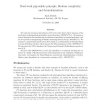Free Online Productivity Tools
i2Speak
i2Symbol
i2OCR
iTex2Img
iWeb2Print
iWeb2Shot
i2Type
iPdf2Split
iPdf2Merge
i2Bopomofo
i2Arabic
i2Style
i2Image
i2PDF
iLatex2Rtf
Sci2ools
APAL
2004
2004
Dual weak pigeonhole principle, Boolean complexity, and derandomization
We study the extension (introduced as BT in [5]) of the theory S1 2 by instances of the dual (onto) weak pigeonhole principle for p-time functions, dWPHP(PV )x x2 . We propose a natural framework for formalization of randomized algorithms in bounded arithmetic, and use it to provide a strengthening of Wilkie's witnessing theorem for S1 2 +dWPHP(PV ). We construct a propositional proof system WF (based on a reformulation of Extended Frege in terms of Boolean circuits), which captures the b 1-consequences of S1 2 +dWPHP(PV ). We also show that WF p-simulates the Unstructured Extended Nullstellensatz proof system of [2]. We prove that dWPHP(PV ) is (over S1 2 ) equivalent to a statement asserting the existence of a family of Boolean functions with exponential circuit complexity. Building on this result, we formalize the Nisan-Wigderson construction (derandomization of probabilistic p-time algorithms) in a conservative extension of S1 2 + dWPHP(PV ). Preliminaries We assume the reade...
APAL 2004 | Randomized Algorithms | Unstructured Extended Nullstellensatz | Weak Pigeonhole Principle |
| Added | 16 Dec 2010 |
| Updated | 16 Dec 2010 |
| Type | Journal |
| Year | 2004 |
| Where | APAL |
| Authors | Emil Jerábek |
Comments (0)

